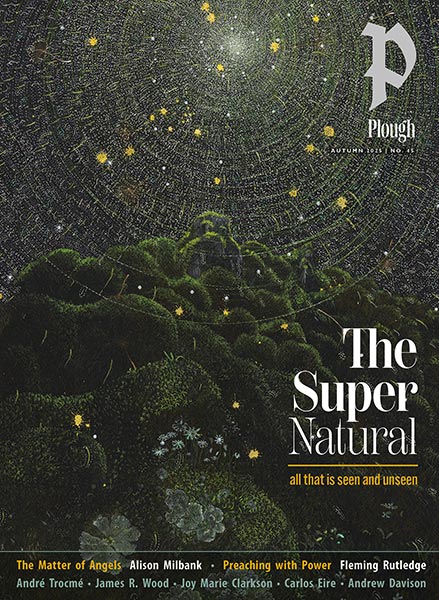Subtotal: $
Checkout
Is It Possible to Rejoice Continually?
Paul’s exhortation to “rejoice always” seems a pretty tall order.
By John Chrysostom
February 23, 2025
There is nothing whatever that will be able to afflict one who is well ordered in mind, and careful about his own soul; but he will enjoy a pure and continued pleasure. And this you have heard from Paul, who exhorts us, saying, “Rejoice in the Lord always, and again I say, rejoice” (Phil. 4:4). I know indeed that to many this saying seems impossible. “For how is it possible,” says someone, “that he who is but a man can continually rejoice? To rejoice is no hard matter, but to rejoice continually, this seems to me to be impossible.” For many are the causes of sadness, which surround us on all sides. A man has lost either a son, or a wife, or a beloved friend, more necessary to him than all kindred; or he has to sustain the loss of wealth; or he has fallen into sickness; or he has to bear some other change of fortune; or to grieve for contemptuous treatment which he did not deserve; or famine, or pestilence, or some intolerable exaction, or circumstances in his family trouble him – nay, there is no saying how many circumstances of a public or private nature are accustomed to occasion us grief. How then, he may say, is it possible to “rejoice always?”
All humankind are universally desirous of pleasure, and gladness, but all are not able to attain it, since they know not the way which leads to it; but many suppose that the source of it is in being rich. But if this were its source, no one possessed of wealth would ever be sad. But in fact many of the rich think life not worth living, and would infinitely prefer death when they experience any hardship; and of all men these are the most liable to excessive sadness. For you should not look to their tables, or their flatterers, and parasites, but to the trouble that comes of such things, the insults, the calumnies, the dangers, and the distresses, and what is far worse, that they meet these reverses unpracticed, and know not how to take them philosophically, or to bear with fortitude what befalls them; whence it happens that calamities do not appear to them such as they are in their own nature, but even things which are really light come to seem intolerable; whereas, with regard to the poor, the contrary takes place; things that are irremediable seem easy to be borne, since they are familiar with many such.

Paul Klee, Translucencies, Orange-Blue, watercolor on paper, 1915.
Others again suppose, that to enjoy good health is the source of pleasure. But it is not so. For many of those who enjoy good health have a thousand times wished themselves dead, not being able to bear the insults inflicted on them. Others again affirm that to enjoy glory, and to have attained to power, and to administer the highest offices, and to be flattered by multitudes is productive of continual gladness. But neither is this the case. And why do I speak of other offices of power? For although we were to mount up in thought to royalty itself, and to him who lives in that station, we should find it encompassed with a diversity of troubles, and having so many necessary causes the more of sadness, in proportion as it is surrounded with a greater weight of affairs. And kings have of necessity as many causes of sadness as there are waves on the ocean. But if monarchy is unable to render life devoid of grief, then what else can possibly achieve this? Nothing, indeed, of this life; but this saying of Paul alone, brief and simple as it is, will of itself open to us this treasure.
For many words are not needed, nor a long round of argument, but if we only consider his expression, we shall find the way that leads to it. He does not simply say, “Rejoice always,” but he adds the cause of the continual pleasure, saying, “Rejoice in the Lord always.” He who rejoices “in the Lord,” cannot be deprived of the pleasure by anything that may happen. For all other things in which we rejoice are mutable and changeable, and subject to variation. And not only does this grievous circumstance attend them, but moreover while they remain they do not afford us a pleasure sufficient to repel and veil the sadness that comes upon us from other quarters. But the fear of God contains both these requisites. It is steadfast and immoveable, and sheds so much gladness that we can admit no sense of other evils. For the man who fears God as he ought, and trusts in him, gathers from the very root of pleasure, and has possession of the whole fountain of joy. And as a spark falling upon a wide ocean quickly disappears, so whatever events happen to the man who fears God, these, falling as it were upon an immense ocean of joy, are quenched and destroyed! This indeed is most to be wondered at, that whilst things which minister sadness are present, the man should remain joyful. For if there was nothing to produce grief, it would be no great matter to him that he was able continually to rejoice; but that at a time when he is urged to sadness by the pressure of many things, he is superior to all these, this is truly a matter for astonishment….
It is evident that amongst those who are outside the church it is impossible to find any situation in life encircled with continual gladness from the things without. But that the believer cannot possibly be deprived of the enjoyment of a continued pleasure is what I will now proceed to prove, to the end that you may not only learn, but also emulate this painless condition of life. For suppose a man having nothing for which to condemn himself, but cherishing a good conscience, and yearning after the future state, and the fulfilment of those good hopes; what, I ask, will be able to throw such a person into sadness? Does not death seem the most insupportable of all things? Yet the expectation of this is so far from grieving him, that it makes him the more joyful; for he knows that the arrival of death is a release from labor, and a speeding toward the crowns and rewards laid up for those who have contended in the race of piety and virtue. But is it the untimely end of his children? Nay, he will also bear this nobly, and will take up the words of Job, “The Lord gave, the Lord hath taken away; as it seemed good unto the Lord, so is it come to pass. Blessed be the name of the Lord for ever” (Job 1:21). But if death and loss of children cannot grieve, much less can the loss of money, or dishonor, or reproaches, or false accusations, at any time affect a soul so great and noble; no, nor anguish of body, since the apostles were scourged, and considered their very scourgings, as a ground of additional pleasure….
And this is the paradox: that not only the sadness of the world, but also its joy, contains extreme loss; but in the case of spiritual things, it is exactly the reverse; and not the joy only, but the sadness too contains a rich treasure of good things! If you have grieved on account of sin, you have blotted it out, and have reaped the greatest pleasure. If you have grieved for your brethren who have fallen, you have both encouraged and comforted yourself, and have also restored them; and even if you were not to profit them, you have an abundant recompense. So that if anyone entertains a godly sorrow, he will thence reap a great advantage.
Since therefore those who are in tribulation are more blessed than those who are free from it without; and those who are sad are more blessed than those in pleasure; what further source of tribulation shall we have? On this account we should call no man happy, save him only who lives according to God…. For what is required of us is that in everything we do or suffer, the fear of God should be the foundation; and if you implant this as the root, not merely will ease, and honor, and glory, and attention produce fruits that shall be pleasurable to you; but hostilities also, and calumnies, and contempt, and disgrace, and torments, and all things without exception. And just as the roots of trees are bitter in themselves, and yet produce our sweetest fruits, so, verily, godly sorrow will bring us an abundant pleasure. They know, who have often prayed with anguish, and shed tears, what gladness they have reaped; how they purged the conscience; how they rose up with favorable hopes! For it is not the nature of the things, but our disposition, which usually make us sad or joyful. If then we can render the latter such as it ought to be, we shall have a pledge for all gladness. If you desire joy, seek not after riches, nor bodily health, nor glory, nor power, nor luxury, nor sumptuous tables, nor vestures of silk, nor costly lands, nor houses splendid and conspicuous, nor any other thing of that sort; but pursue that spiritual wisdom which is according to God, and take hold of virtue; and then nought of the things which are present, or which are expected, will be able to sadden thee. Verily, the things that make others sad, will prove to you an accession of pleasure.
Source: Lent Readings from the Fathers, Selected from The Library of the Fathers, ed. by W. J. Early and E. B. Pusey (James Parker & Co, 1872), 22–29.
Already a subscriber? Sign in
Try 3 months of unlimited access. Start your FREE TRIAL today. Cancel anytime.






